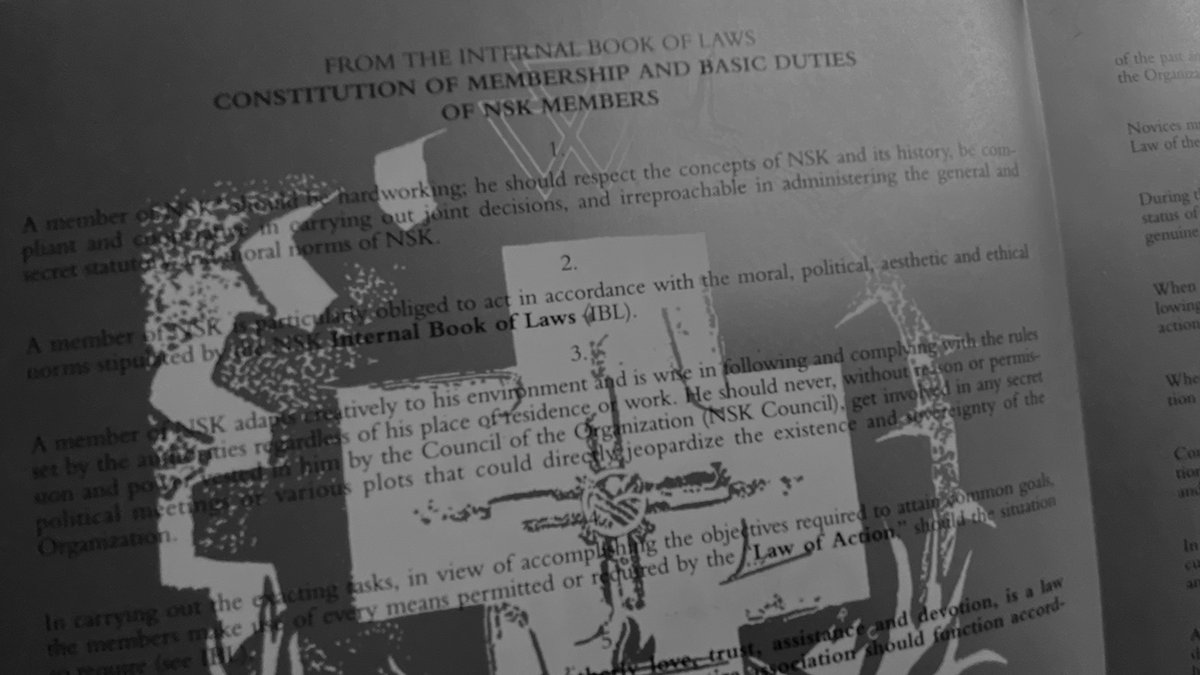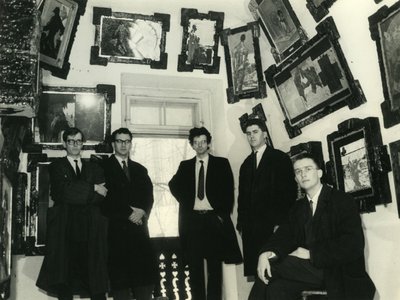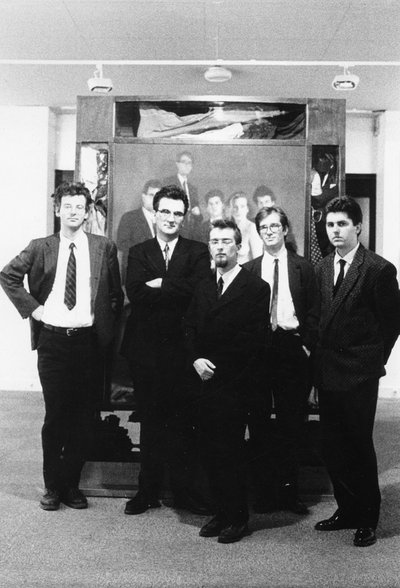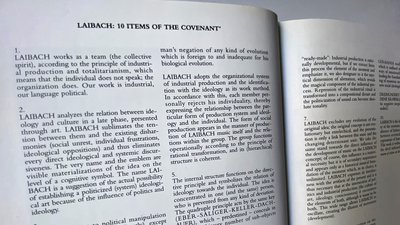1.
A member of NSK should be hard working; he should respect the concepts of NSK and its history, be compliant and co-operative in carrying out joint decisions, and irreproachable in administering the general and secret statutory and moral norms of NSK.
2.
A member of NSK is particularly obliged to act in accordance with the moral, political, aesthetic and ethical norms stipulated by the NSK Internal Book of Laws (IBL).
3.
A member of NSK adapts creatively to his environment and is wise in following and complying with the rules set by the authorities regardless of his place of residence or work. He should never, without reason or permission and power vested in him by the Council of the Organization (NSK Council), get involved in any secret political meetings or various plots that could directly jeopardise the existence and sovereignty of the Organization.
4.
In carrying out the exacting tasks, in view of accomplishing the objectives required to attain common goals, the members make use of every means permitted or required by the “Law of Action”, should the situation so require (see IBL).
5.
To cherish mutual respect, friendly and brotherly love, assistance and devotion, is a law obligatory for ALL members of the Organization. The entire association should function according to the principles of equality and harmony of internal distinctions.
6.
No personal animosity, no settling of personal conflicts or disputes may enter the Organization. The same holds true, yet even to a larger extent, of arguments related to religion, nationality or political system, which never have and never shall serve the purpose of the Organization.
7.
Once a member is inducted, the association denies each member his own freedom of choice regarding his religious persuasion, and political and aesthetic affiliation.
8.
Each membership candidate must believe in the hierarchical principle and existence of the supreme substance (ICS – the immanent, consistent spirit), occupying the uppermost position in the hierarchy of NSK.
9.
Each candidate must be aware of the past, be active in the present and susceptible to the future. He should be conscious of the tradition of the fundament, should have a feel for innovating experiments and a talent for combining the two.
10.
A member-to-be should be of sound character, emotionally balanced and of sound mental health. He should be capable, with all sincerity and conscience, of answering the following questions affirmatively:
1. Do you present yourself before this Organization, with truth and honesty, free of any prejudice that would interfere with your personal dispositions, as a free person and of your own free will, without being forced or subjected to inappropriate pressure, and present yourself as a candidate for membership in this organization?
2. Do you maturely and responsibly claim the status of member in this Organization and its pertaining privileges, having taken a clear stand on the world and its history?
3. Do you truly and responsibly pledge to perform your duties for the Organization loyally, respectfully, and in the spirit of its laws and practices?
11.
Once a novice is given his pledge of allegiance, he is required to adopt the principle of conscious renunciation regarding his personal tastes, judgement, and beliefs (...); he is required to renounce his personal practices of the past and devote himself to work in the body whose integral element he has become by joining the Organization.
12.
Novices must respect elder members and the “Triple Principle”, which is the supreme designer of the Law of the Organization.
13.
During the first year of their novitiate, the novices belong to the so-called team reservoir and have the status of a student-apprentice. They first learn the law of cause and effect, which applies to the art of genuine domination and genuine subordination.
14.
When praising tradition, history and the supreme principle of NSK, each member must obey the following law of the IBL: a member should never speak of the Organization and its inner principles of action without due respect.
15.
When honouring and exposing himself through self praise, etc., a member should avoid any exaggeration and inconsistencies so as to preserve his individual and collective pride.
16.
Concerning one’s love for one’s neighbour (one’s friends, family, wife and neighborhood), IBL exceptionally permits members of NSK to practice Christian relations, if these comply with the social system and its system of values, yet advises them to exercise caution in their good deeds.
17.
In his role of a social and civil being, a member should be co-operative and benevolent should the circum- stances so require, to the extent that such behaviour and generosity do not harm himself, his family, and his friends in particular.
18.
As a community member and a citizen, a member of the Organization should abide by the laws designed to protect him. He should avoid any punishment and interdiction: in critical circumstances, he should not allow any prejudice, originating from what he does, to instigate a feeling of self-guilt.
19.
When a person expresses the wish to become a member of the Organization, his wish should be given careful consideration and a recommendation submitted only if and when he is found to comply with the principles of the Organization and to contribute positively, in terms of personality and activity, to the strength and promotion of its common interests.
20.
Members are recommended to devote their spare time associating with those who cooperate with the Organization.
THE FIVE BASIC PRINCIPLES OF FRIENDSHIP
1. I shall lavish brotherly respect on you if I know you are worthy of it.
2. I shall risk danger and hardships to help you in your time of need, providing this does not harm me nor the Organization.
3. In my daily activities and when taking on special duties, I shall first mention your name and then mine.
4. I shall support you in your work and self-denial, and shall help you reach these goals as if I were in your place.
5. I shall never do unto you what I do not want you to do unto me, unless there is a common reason for that.
21.
If a member knows his place in his home group and in a wider body to which he belongs, and has particularly excelled in his work, he shall be presented with a reward according to his rank and stipulations of the IBL. Should he neglect his work, he shall be excommunicated or punished.






